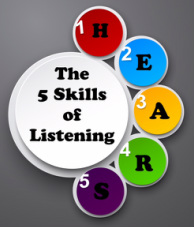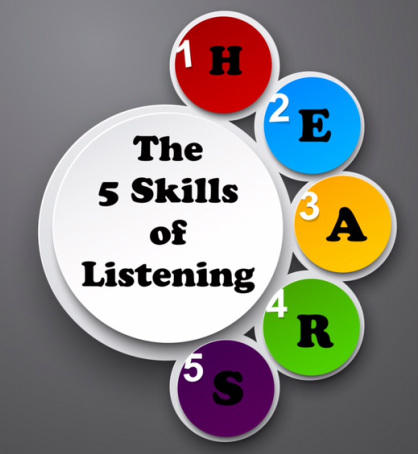
"When people talk, listen completely. Most people never listen." --Ernest Hemingway
I pride myself on being a good listener.
As a sales professional and a team leader, effective listening is critical to my success. Is being a good listener important to you too?
Really listening to others has become increasingly challenging given the plethora of electronic distractions—namely our smart phones and their texts, tweets, chats, check-ins, notifications, emails, dings, tones, and buzzes!
When I find myself losing my concentration during conversations with others, I mentally run through these 5 Skills of Listening to immediately put myself back in the moment. I use the acronym H.E.A.R.S. as a way to recall, and implement these skills:
I pride myself on being a good listener.
As a sales professional and a team leader, effective listening is critical to my success. Is being a good listener important to you too?
Really listening to others has become increasingly challenging given the plethora of electronic distractions—namely our smart phones and their texts, tweets, chats, check-ins, notifications, emails, dings, tones, and buzzes!
When I find myself losing my concentration during conversations with others, I mentally run through these 5 Skills of Listening to immediately put myself back in the moment. I use the acronym H.E.A.R.S. as a way to recall, and implement these skills:
The 5 Skills of Listening:
1. Hone-In on the other person in your conversation to physically demonstrate your undivided attention (I imagine having blinders on the sides of my face). Position your body so that you are full-facing your partner—with proper posture, either sitting or standing. Put all devices completely away.
"You cannot truly listen to anyone and do anything else at the same time." --M. Scott Peck
2. Eye-Contact is to be made directly and sincerely with your partner.
Former President, Bill Clinton was masterful at giving each person his undivided attention when listening—if even for a few brief moments.
3. Ask Questions to engage in the listening, and to demonstrate your attention and interest in what the other person is saying (instead of thinking about what you’re going to say!).
"Most people do not listen with the intent to understand; they listen with the intent to reply." --Stephen R. Covey
4. Read Body Language for non-verbal messages. What emotion is your partner expressing? Is the person looking for a solution or merely venting? Is there a hidden message?
"The most important thing in communication is hearing what isn't said" --Peter Drucker
5. Summarize the points of the conversation, and repeat them back to your partner to make sure you understand the message. This also demonstrates to your partner that you heard what he or she was saying--you truly listened!
"One of the most sincere forms of respect is actually listening to what another has to say." --Bryant H. McGill
1. Hone-In on the other person in your conversation to physically demonstrate your undivided attention (I imagine having blinders on the sides of my face). Position your body so that you are full-facing your partner—with proper posture, either sitting or standing. Put all devices completely away.
"You cannot truly listen to anyone and do anything else at the same time." --M. Scott Peck
2. Eye-Contact is to be made directly and sincerely with your partner.
Former President, Bill Clinton was masterful at giving each person his undivided attention when listening—if even for a few brief moments.
3. Ask Questions to engage in the listening, and to demonstrate your attention and interest in what the other person is saying (instead of thinking about what you’re going to say!).
"Most people do not listen with the intent to understand; they listen with the intent to reply." --Stephen R. Covey
4. Read Body Language for non-verbal messages. What emotion is your partner expressing? Is the person looking for a solution or merely venting? Is there a hidden message?
"The most important thing in communication is hearing what isn't said" --Peter Drucker
5. Summarize the points of the conversation, and repeat them back to your partner to make sure you understand the message. This also demonstrates to your partner that you heard what he or she was saying--you truly listened!
"One of the most sincere forms of respect is actually listening to what another has to say." --Bryant H. McGill





























 RSS Feed
RSS Feed